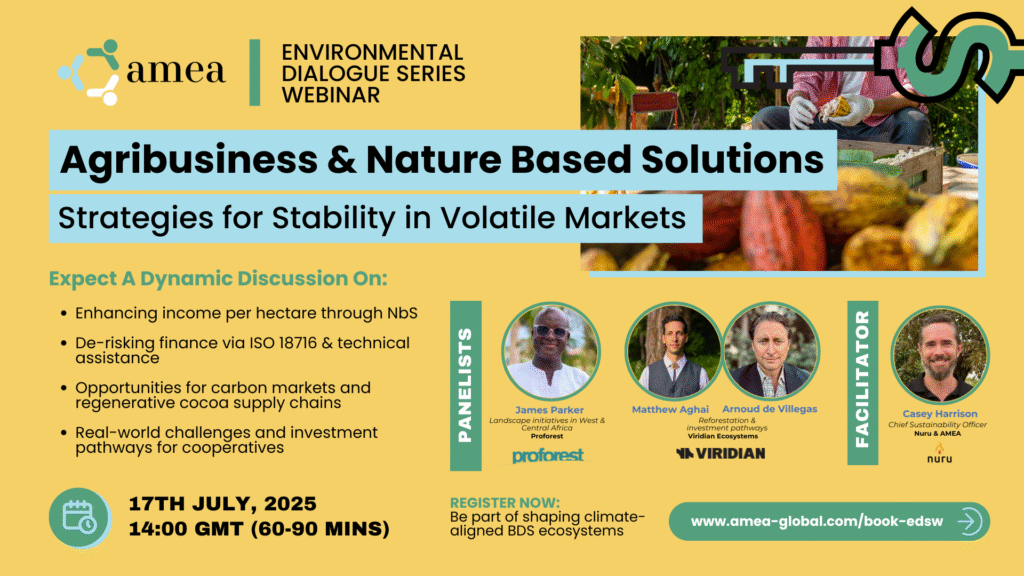AMEA Environmental Working Group

Our inaugural Environmental Working Group webinar brought together leaders to explore how professional farmer organizations, agri-SMEs, and BDS providers can leverage carbon markets, regenerative agriculture, and agroforestry for environmental and economic resilience.
Strategic Foundation Setting
Casey Harrison’s opening remarks provided essential context on de-risking finance and improving resilience for farmer organizations navigating today’s complex environmental landscape.
Regenerative Impact in Action
James Parker shared compelling insights from the Ghana Cocoa Forest Restoration Partnership (GCFRP), demonstrating how regenerative cocoa systems deliver measurable environmental benefits while enhancing farmer incomes.
Scaling Nature-Based Solutions
Viridian’s presentation illustrated practical approaches to operationalizing nature-based solutions in African agro-ecosystems through innovative blended finance mechanisms.
Matthew and Arnaud from Viridian delve into the importance of land managers and communities in achieving both short-term and long-term sustainable outcomes. The conversation highlights the critical steps involved in developing commercially viable agroforestry (AR) projects, including local dynamics assessment, supply chain fortification, and financial viability. The panelists emphasize the significance of selecting strong local partners, providing technical assistance, and ensuring the durability of stakeholder engagement over time. The session also explores challenges and solutions experienced in the field, such as farmers’ fatigue from frequent changes in farming practices and the importance of showcasing successful models to encourage adoption. This comprehensive discussion is crucial for anyone interested in sustainable agricultural development and nature-based solutions.
James Parker from Proforest’s African Regional Office discusses the Ghana cocao REDD+ Program, targeting carbon market opportunities and regenerative cocao supply chains. The presentation outlines Proforest’s work in reducing deforestation rates through climate-smart cocao practices and improving smallholder farmers’ livelihoods. Key focus areas include a 5.6 million hectare cocao forest landscape, results to date, performance indicators, transparent benefit-sharing mechanisms, and regional collaboration efforts. Challenges such as funding, farmer adoption, and data management are also addressed.
Questions and discussion on sustainable land management and the development of commercially viable Agroforestry (AR) projects featuring insights from Viridian’s Arnaud and Matthew, and experiences from Proforest’s implementation in Ghana. This conversation covers the essentials of project setup, including local dynamics assessment, financing pathways, and supply chain management. The panel also addresses farmers’ adaptation to new practices, overcoming barriers, and enhancing financial viability for long-term sustainability.
We’re launching an exciting new dialogue series focused on practical solutions that enable agri-SMEs and cooperatives to thrive in volatile markets while delivering climate impact. Signup to stay up to date with upcoming events.
We use cookies on our website to give you the most relevant experience by remembering your preferences and repeat visits. By clicking “Accept All”, you consent to the use of ALL the cookies. However, you may visit "Cookie Settings" to provide a controlled consent.